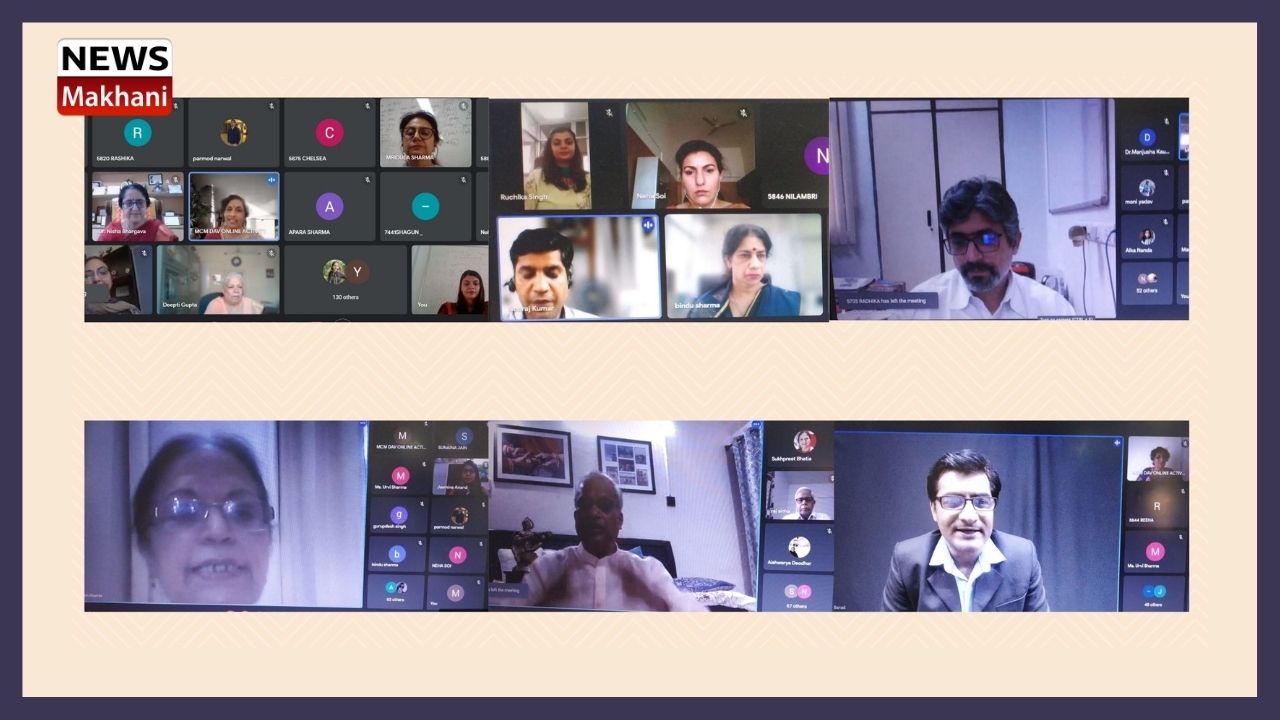CHANDIGARH 20-OCTOBER -2021,
The Department of English, Mehr Chand Mahajan DAV College for Women, Chandigarh organised a national-level online 30 hour workshop titled ‘Contemporary Research: Scope, Challenges and Methodology’ for a heterogeneous group of faculty members, research scholars and post-graduation students to apprise them of the nuances of research as recommended in the National Education Policy 2020. Nearly 157 participants from different parts of the country enrolled for this programme. Eminent researchers and academicians from different universities, including Prof Deepti Gupta, Department of English and Cultural Studies, Panjab University, Dr Neeraj Kumar Singh, Deputy Librarian, AC Joshi Library, Panjab University, Prof Praveen Sharda, Department of English, University School of Open Learning, Panjab University, Prof Gurupdesh Singh, Department of English, Guru Nanak Dev University, Amritsar, Prof Aneel Kumar Raina, Department of English and Cultural Studies, Panjab University, Prof Vivek Sachdeva, USHSS, Guru Gobind Singh Indraprastha University, Delhi, Prof Dilip Barad, MK University of Bhavnagar, Gujarat, and Prof Sudhir Kumar, Department of Evening Studies, Multi-Disciplinary Research Centre, Panjab University, delivered lectures in this 8-day academic event. Principal Dr Nisha Bhargava, Convenor of the programme appreciated the Department of English for undertaking this well-structured programme consisting of live lectures, assessment, feedback and discussion forum to make it a holistic academic initiative. Dr. Bhargava stressed upon the significance of this endeavour as she highlighted the role of quality research in informed policy making and promoting social welfare.
READ MORE :-2 positive cases reported in UT Ladakh; 12 patients cured and discharged
Prof Deepti Gupta enlightened the participants about the linguistic subtleties of research writing in her session ‘Language Matters’ on the inaugural day. She dwelt upon the idea that a research question must be very precise as ambiguities and presumptions can claim no space in research writing, and also exhorted the participants to state clearly the gaps in research which spur them to undertake research in that specific area. Dr Neeraj Kumar Singh delivered a stimulating session on ‘Contemporary Research—Use of Open Educational Resources’ wherein he apprised the participants about the knowledge resources which can help them navigate their research journey. He gave a very lively presentation on various tools like Jorum, Xpert, Flickr, which the researchers can use in order to substantiate and strengthen their research quotient. Project Guttenberg, MIT OpenSourceWare, Oyester, Core, e-PG Pathshala, UGC-Swayam, Shodhganga, National Digital Library, are useful repositories which can truly make the research a fruitful enterprise, said Dr Neeraj. Prof Praveen Sharda shed light on ‘Literature Review: Challenges and Strategies’. She remarked that literature review in the dissertation must be systematic and relevant to the research question being undertaken, and can be based on the concept and theory which the researcher is going to apply on a specific text or author and it can also be on the methodology which will be adopted by the researcher. In a highly interactive session on ‘Research and Research Writing’, Prof Gurupdesh Singh reinforced the idea that all research is meant to fill the gaps in the hitherto available body of work in a specific area and therefore, the researchers must pay attention to the language they use while formulating their research question. He suggested that the researchers must use, apart from the library resources, like manuscripts, books, journals, films, museums, art galleries, field studies, videos, audio-books, blogs too. Prof Aneel Kumar Raina gave a lecture on ‘Citations, References and Bibliography as per MLA Handbook’. He focused on the need for precision in citing one’s sources in the research work as this can make or mar the credibility of the researcher. Distinguishing MLA style from other styles, such as Chicago or Harvard, he reminded the young researchers that Panjab University, at present, prefers MLA Handbook 8th Ed for citing sources for Ph.D theses. Prof Vivek Sachdeva delivered a lecture on ‘Time and Space in Films: A Narratological Perspective’. By showing a few snippets from the movies like Sardari Begum and Zubeida by Shyam Benegal, he explained that a film-maker creates a discourse and a literary text and film-adaptation are two parallel mediums and must not be compared. He motivated the students to undertake research in film-adaptations and OTT as these are very fertile academic fields. Prof Dilip Barad delivered an exhaustive session on the pivotal aspect of research, ‘Research and Publishing Ethics’. He guided the participants as to how they can keep plagiarism at bay by using very useful softwares like Orkund and Turnitin. He exhorted them to create their research profile to enable their connectivity in the academic circles. On the concluding day, Prof Sudhir Kumar gave an enlightening talk on ‘Some preliminary Observations on Research and Problem of Non-translatability with Special References to Indian Literary Tradition and Cultural Studies’. He highlighted the fact that researchers, most often, use words from Indian philosophy in English translation without knowing that the essence of these concepts and words cannot be captured in the English translation. He insisted that the researchers must read and understand the original works in order to capture the conceptual nuances. The participants found the programme highly relevant and useful.

 हिंदी
हिंदी






